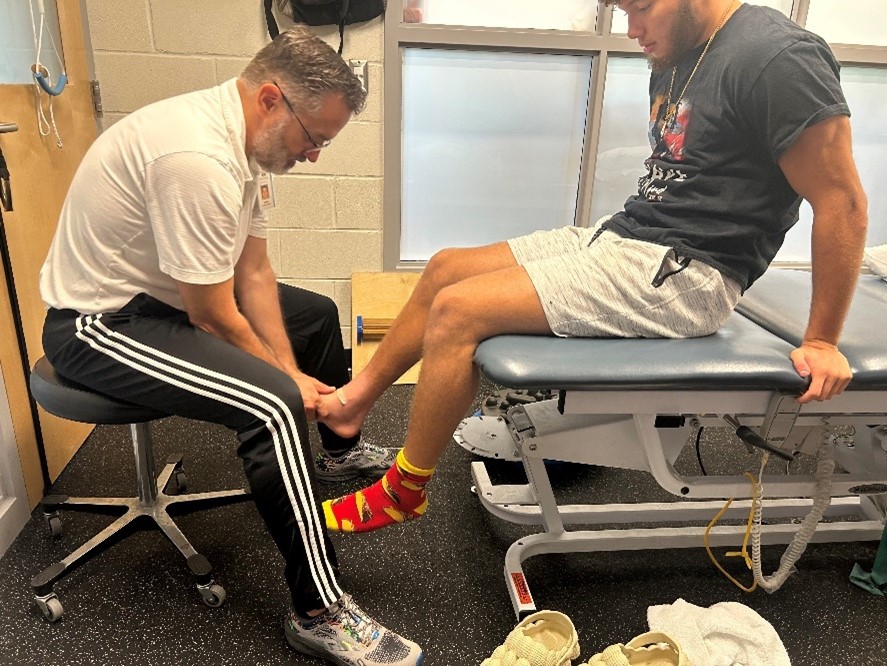Written By: Jason Handschumacher, PT, DPT, OCS

You can read about career burnout anywhere today(1). This is across the board and maybe more keenly in our Healthcare professions. I want to provide some personal insight to help avoid that. With this “a month in the life of a PT” I hope you can relate or be inspired by why you chose this career. I recommend three areas to minimize burnout: Serve, Diversify, and Collaborate.
I work in the Charlotte, NC metro area for the Medical University of South Carolina. Primarily in our outpatient settings but I include mentoring students, collaborating with our Athletic Trainers, coordinating with Strength and Conditioning coaches, weekend work with our inpatient nurses and staff, volunteering my time for international missions, and traveling to teach seminars for Summit Professional Education. I will run down my past few weeks to brag about how diverse and varied this profession can be – you get to choose.
I spent a week in Guatemala building houses and planning future medical mission trips to remote villages. My first week back I had the final sessions mentoring a first-year PT student completing his first clinical rotation. The next week I had the initial post-operative evaluation of a high school senior football player with college aspirations who just had a repair of a high ankle sprain. I then spent a couple days in Tennessee teaching my 4 courses (Learn More) for Summit Professional Education. I flew home Saturday night to work a Sunday shift on our acute Neuro and ICU floors. I do find time – very early most mornings – to exercise. While finishing some deadlifts, a Strength and Conditioning Coach at the gym I know wanted to pick my brain about training volumes and return to sports for a college volleyball player. Yeah – this profession is what you make it.
Feel in a rut professionally? Diversify. We work in a field that is wide open – choose your setting(s) and shift course as you go. Eight years ago, I decided to add teaching seminars. What started as a 6-hour course on Joint Replacements in North Dakota – has transformed into multiple course offerings across the country, webinars, a podcast, and now blog posts. This makes me try to stay on top of the game – read those research articles – reflect on what I did years before that is outdated – and collaborate with many of you. I learn from conversations and questions with PTs, OTs, PTAs, and COTAs during – usually after – each of the courses. I come home from each trip refreshed yet tired.
Collaborate with other professions. As I write this – today I have a presentation with our local high school ATCs on shoulder stability in athletes. To help the young football player achieve his goal of getting back on the field 6 weeks after surgery, I check in weekly with his surgeon and school ATC for activity progressions. On my acute care weekends, I talk with nurses, case managers, Hospitalist physicians, and patient families to make recommendations for care and the next steps in the patient’s recovery. Expand that spectrum to Strength and Conditioning coaches where I can speak to them about injury recovery and training schedules in their athletes.
Welcome to October – National Physical Therapy Month – take this profession you chose and go make a difference. I hope to see you this Fall with my upcoming Multi-Course tour including a 6-hour Live Stream on December 2nd, An Evidence-Based Approach to Treating the Lumbopelvic Complex.
Explore online continuing education courses from Jason below:
An Evidence-Based Approach to Treating the Lumbopelvic Complex
Clinical Practice Guidelines for Low Back Pain (LBP)
Simplifying Assessment and Treatment of the Sacroiliac Joint & Hip Dysfunction
Total Knee/Hip Arthroplasty: The First 72 Hours
References:
- Murthy, VH. Confronting Health worker Burnout and Well-Being. New England Journal of Medicine; August 2022, Vol. 387, 577-579e. DOI: 10.1056/NEJMp2207252
Visit summit-education.com for more information.